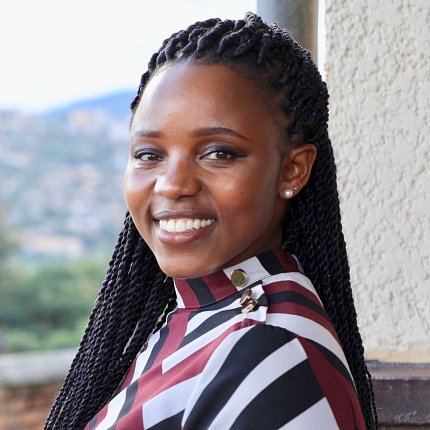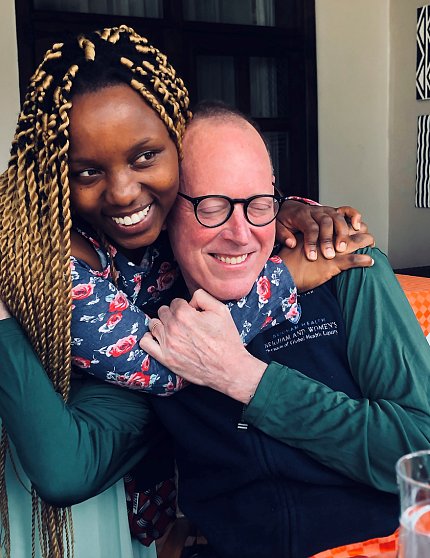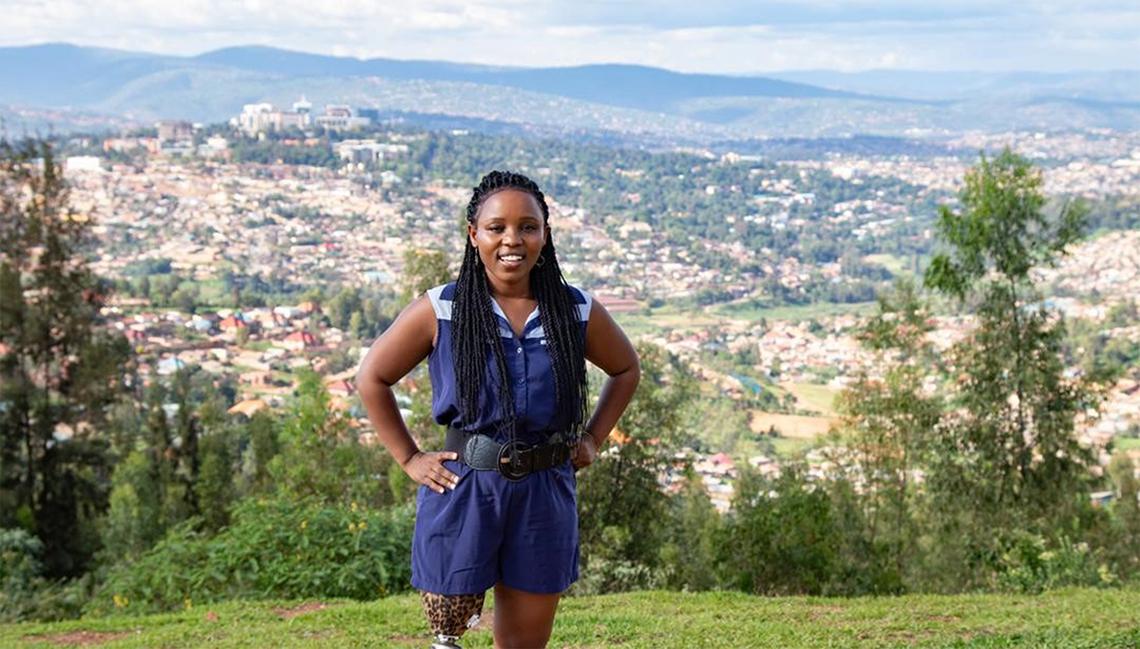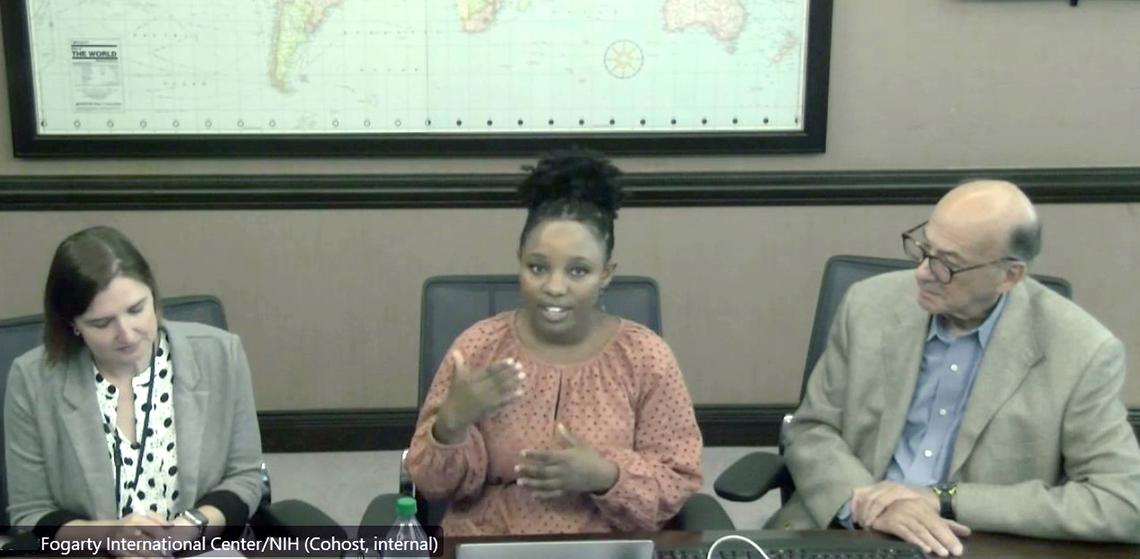From Amputee to Advocate
Rwandan Trainee Takes Steps to Help Others

There was a time when Claudine Humure was not sure she would ever walk again or even survive. Now, she’s climbing to new heights and aspiring to help others in her home country.
A master’s student in prosthetics and orthotics at the University of Washington, Humure plans to return to her native Rwanda after training to improve prosthetic care for those who have lost limbs. Her professional journey is a deeply personal one. She shared her story at a Sept. 7 Fogarty International Center-National Institute of Child Health and Human Development co-sponsored lecture.
At age 6, Humure lost both of her parents in the aftermath of the Rwandan genocide. She and her siblings were raised in an orphanage, where fortunately she found solace and kindness. But at age 12, her health began declining and it took many months to get a diagnosis.
It was incredibly difficult “sitting in the unknown for so long with constant, chronic pain that did not seem to be relieved by any sort of pain medication,” she recounted. “I had lost all hope of ever recovering because, by that time, I had been in front of so many doctors who failed to diagnose my illness.”

In 2005, she became one of the first patients of the late Dr. Paul Farmer, whose nonprofit Partners in Health [PIH] had just expanded its health care operation into Rwanda.
At first, they incorrectly treated her for tuberculosis of the knee only to realize the medication wasn’t helping. Farmer then took a biopsy and sent it to colleagues at Massachusetts General Hospital in Boston, where Humure received her diagnosis.
“I was still recovering from my second surgery when I was finally diagnosed with osteosarcoma—bone cancer,” Humure said. The recommendation was amputation.
“The cancer had already eaten all of my proximal tibia and was making its way down the whole bone into my fibula,” said Humure. Having her leg amputated “was the most traumatic and worst experience of my life thus far…but I am now grateful to still be alive.”
The PIH team arranged for Humure to travel to Boston to get chemotherapy and additional surgery. At Mass General, she was introduced to the world of prosthetics and would take her first step on her first prosthetic leg.
“That first step was monumental for me,” she said. “It really felt like a privilege because I had grown up seeing many people with amputation in wheelchairs, or on the streets of Rwanda as beggars, and I constantly imagined my life being the same.”
At the time, she didn’t speak English, making the experience especially scary.

“Most people living with an acquired limb loss go through months or years of therapy to be able to accept and process their new reality,” she said. “For me, that first prosthesis was my therapist. My hope was restored.”
After physical therapy, Humure returned to Rwanda to go back to school. A year later, her prosthetic leg broke.
“That’s when I noticed the lack of resources around the country, as I traveled from hospital to hospital, looking for a prosthetic clinician who could put my leg back together,” she recalled. “Unfortunately, I didn’t find one.”
This led Humure back to Boston for a new prosthetic leg and to continue her studies. “There began my journey with advanced prosthetic technology that used microprocessor knees and shock-absorbing feet,” she said. “I was able to see how innovations in prosthetic design can be tools that truly change the future.”
With access to the latest technology, she began interning in prosthetic labs.

“I worked on my first transtibial prosthetic socket,” Humure said, describing a summer internship at Next Step Bionics and Prosthetics in Newton, Mass. She later interned in the biomechatronics group at MIT’s Media Lab and at Autodesk, where she learned more about computer-assisted technology.
In 2017, Humure won a $10,000 genius award from digital publisher OZY Media for designing a low-cost, 3D-printed, adjustable prosthetic socket. She was inspired by conditions in her home country.
Rwandan genocide left behind many amputees; traffic accidents have produced even more. Disability limited opportunities for those who have lost limbs; many are homeless. The need is great for reliable, affordable prosthetics.
One of the most densely populated countries in Africa, Rwanda has experienced unity and growth in the last two decades.
“Unfortunately, despite the wonderful improvements in the health sector, Rwanda’s amputee population and the disability community in general remain at the bottom,” said Humure. “In fact, in Rwanda and in most low- and middle-income countries, amputation is often in my opinion considered a health care concern as it happens. But once the patient has healed from all the injuries or wounds, they are sent home and almost forgotten.”
There are prosthetic clinics in Rwanda, scattered near the capital, but they are understaffed with few resources. Humure wants to change that by opening her own prosthetics center, a state-of-the-art facility with clinical care, clinical research and continuing training for staff. PIH—which has opened three hospitals and a university in Rwanda—is her model and inspiration.
“Partners in Health gave me a second chance at life,” she said, and now she wants to return the favor. “I watched firsthand how powerful the PIH model of serving those most in need—by bringing health care and education resources directly to them—can be.”
After graduating from college, Humure returned to Rwanda to work at PIH’s University of Global Health Equity. Now back in the States, she expects to finish her master’s to become a certified prosthetist and orthotist in June 2023, after which she will enter a 2-year residency. Then she plans to focus on making her envisioned prosthetic center in Rwanda a reality.
“I am a living example that people with amputation are more than capable of achieving great things—we are creative and motivated,” she said. “And I have no doubt that my future prosthetic center will help restore hope and boost morale for people living with amputation in Rwanda and in sub-Saharan Africa.”
